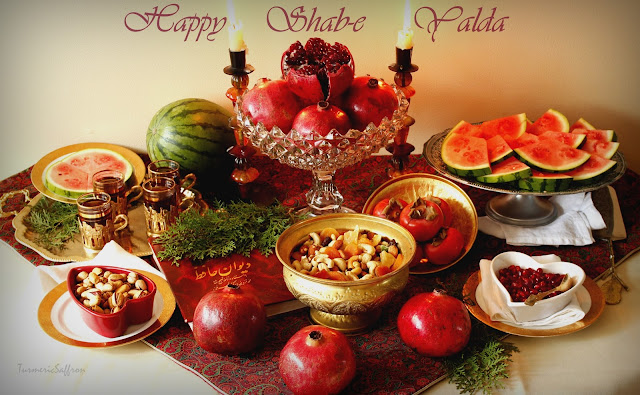شب چله/شب یلدا Shab-e Yalda/Shab-e Chelleh, the ancient Persian celebration of the longest night, dates back thousands of years ago to the birth of میترا Mithra the god of light who was born on the eve of yalda (winter solstice). After the longest night of the year, the days will gradually become longer symbolizing the victory of light over darkness. The word یلدا yalda means birth in سریانی Syriac language and for Iranians, the eve of yalda is a time for the joyful celebration filled with poetry, music, and delicious food. For me, celebrating the Iranian festival of light is a meaningful جشن jashn (festivity) perhaps because it was always celebrated in our home growing up in Iran. The night of yalda is a time to reflect and appreciate how our ancestors kept this tradition alive for several millennia. Looking at our history, I can only imagine how many of those shab-e yalda gatherings took place amid uncertainties, unrest, battles and frightening dark times. However, they did not succumb to the madness of their times and held on to the belief that light will prevail over darkness. It inspires us to light the candles on this night, serve the traditional winter fruits, nuts and sweets, read poetry, share happy memories and pass on the tradition to future generations.
Almost all of the dried autumn leaves in my yard have been raked and the grill cleaned and put away for the season. I'm going to miss the whole experience of outdoor cooking -- the taste and the smell of food cooked on an open fire outside. Perhaps on one or two occasions I'll brave the cold and pull out the grill from under the plastic covers and make some koobideh. kotlet, shami and kabab deegi are stove-top alternatives to grilled kababs although they can be cooked any time of year regardless of the season.
شامی هویج (Carrot shami) is a favorite in our home. This shami kabab is made with chickpea flour or you can use mashed cooked chickpeas as well. Chickpea flour adds a nutty flavor to these meat patties and the shredded carrots add a little sweetness. This recipe can also be made with زردک zardak (parsnip) instead of carrots. Carrot shami may be simmered in a sweet and sour tomato sauce dressing and it's best served with rice. You can also add a handful of finely chopped herbs to the meat mixture for extra flavor and aroma.
Ingredients:
Makes about 16 patties
1 1/2 pounds ground beef, lamb, or turkey
1 1/2 cups shredded carrots
3 tablespoons chickpea flour
1 large yellow onion, grated
2 garlic cloves, minced
3 eggs, lightly beaten
1/2 teaspoon turmeric
Pinch of cinnamon
1 teaspoon salt or to taste
1/2 teaspoon black pepper or to taste
Oil for frying
Ingredients for the sauce:
1 onion, thinly sliced
1 tablespoon tomato paste
1 tablespoon pomegranate molasses
1 tablespoon sugar
Salt and pepper to taste
Water
Method:
- In a large bowl combine meat, carrots, chickpea flour, onion, garlic, eggs, turmeric, cinnamon, salt, and pepper. Mix thoroughly until well blended.
- In a non-stick skillet or a cast-iron skillet heat 3 tablespoons of oil over medium heat.
- Take a handful of the meat mixture, shape it into a small ball, flatten it as the size of your palm and make a hole in the center with your finger. You can also make oval-shaped patties.
- Fry the patties until the meat is nicely browned on both sides.
- In a large skillet heat 2 tablespoons of vegetable oil over medium heat. Add the onions, saute until soft and golden.
- Add the tomato paste and saute for a couple of minutes.
- Add 2 cups of water, pomegranate molasses, sugar, salt, and pepper to taste. Stir well and bring to a boil. Lower the heat, layer the shami kababs in the skillet. Cover and simmer on low heat for 15-20 minutes,
A collage of past Yalda nights
Happy Shab-e Yalda! Happy Winter Solstice!







